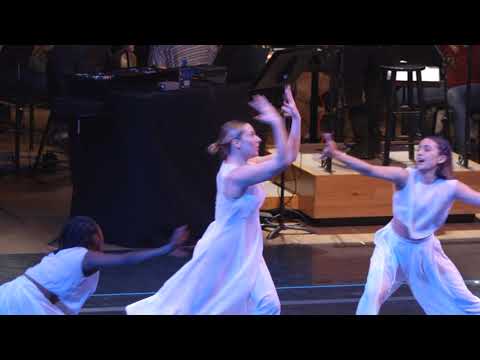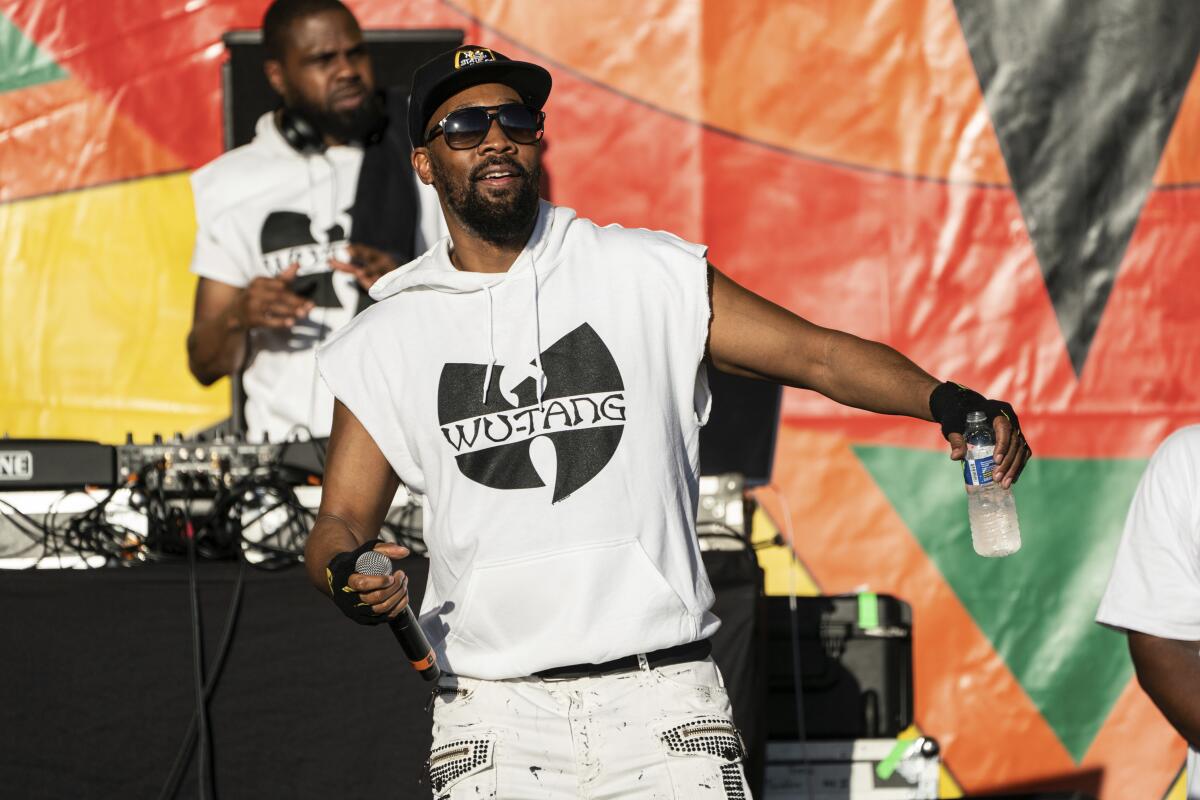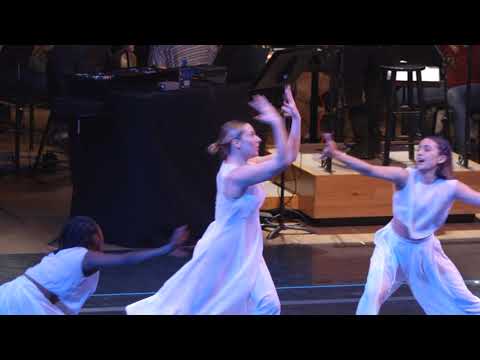Since Wu-Tang Clan leader RZA started chopping up samples and making hip-hop beats on a drum machine nearly 40 years ago, he’s been pulling inspiration from a variety of musical genres and mediums, ranging from 1970s soul and orchestral tracks to kung-fu films.
But it wasn’t until the legendary producer and artist challenged himself to make his first classical album, “A Ballet Through Mud” (released in August), that he recognized that he’s always been a composer — his journey has just been different.
“I have been composing my whole life, although I didn’t know initially that was what I was doing,” says RZA, who provided the soundtrack for movies such as “Kill Bill” and “Ghost Dog: The Way of the Samurai.”
After finding an old notebook filled with hundreds of pages of lyrics from his childhood during the pandemic, RZA dreamed up a magical, 11-track composition that follows six characters — each named after Greek musical scales — as they navigate the complexities of life, friendship and personal growth. With the help of the Colorado Symphony, which performed on the album, and a ballet performance choreographed by Yusha-Marie Sorzano, RZA brought the album to life with two live shows at the Boettcher Concert Hall in Denver last year.
On Monday, RZA brings the show to Los Angeles for the first time. The sold-out event at the Los Angeles Theater, presented in partnership with Platoon, 36 Chambers and Classical California KUSC, will be conducted by Oliver Zeffman and performed by USC Thornton School of Music students and alumni, along with a ballet performance by Sorzano Dance Works. Also, the show will be presented in L-ISA, an ultra-high-quality sound experience that creates an immersive experience.
We recently caught up with RZA over the phone to talk about the upcoming show, how his Buddhist practice inspired the album and how making it unlocked a new level of confidence in his artistry. This interview has been lightly edited for length and clarity.

This project started during the pandemic when you found an old notebook filled with lyrics you wrote when you were a teen. Where did you find the notebook and how did it make you feel reading those lyrics from so long ago?
It was in storage in this old Tommy Hilfiger duffel bag and it had a few books in it. It even had some of the Wu-Tang Clan lyrics all in this bag that I must’ve stuffed years ago while bringing some stuff from the East Coast to the West Coast. When I was reading the notebook, it took me back to my childhood and it reminded me of something: my high school English teacher, Mr. Joe Sicilian, who really had a lot of aspirations for me. I made the honor roll. I was in the honors class for writing. He had me writing for the newspaper. He just really believed that I could be a good writer and he said you should always write in your journal every day. So I would have the journal, but I’d be writing lyrics. Then I started bringing my blue binder [to school] and in most classes, I would finish my work quick and start writing songs and lyrics. Whether I was in the classroom or to be quite frank with you, I cut a lot of classes too. So if I cut class and I’m in the lunchroom, I’m writing lyrics. Or when I’m riding that Staten Island ferry, I’m writing songs, so this book has hundreds of pages in it to be quite frank and it’s just like, wow. It’s almost like my diary in story form.
Eventually, you scrapped the lyrics and decided to make your very first classical album. What was the a-ha moment that you should move into that direction instead?
My wife was very influential in that capacity because I think from her point of view, she’s seen me go from RZA to Bobby Steelz to Bobby Digital. You know, there’s so many different renditions of lyrical performances and songs, and I think that as I was trying to say the lyrics after the music was created, it actually was interfering with the music in the sense of it was making you think something versus allowing you to think, and she kind of pointed that out. We actually recorded the lyrics to some of these songs. We tried some, but one of the a-ha moments was just traveling on a road trip and the music was playing, and my wife turned to me and pitched me a movie idea, which she never does. A whole movie played through her head listening to these tracks and I was like, OK, she’s right. Let it exist for the listener to go ahead and find their story within it.
The album also has a ballet component, which was choreographed by Yusha-Marie Sorzano. What was it about the Alvin Ailey documentary you watched that inspired you to add this component to the show and how does it add to the overall experience of the album?
Watching him striving to tell stories through dance and he was striving to show the Black experience in a way. He was also striving to break away from the box of traditionalism and open up the floor to more unique expressions, and I didn’t know that, of course, as a kid. Obviously living in New York, you always would see his name and I never was interested in that stuff, but as my art grew and then I saw this documentary, I was able to relate that there’s so much in a music melody and a music harmony, but there’s much in body movement. There’s so much story that can be told in moving bodies without dialogue, and he’s mastered that. He left a legacy of that and I walked away inspired and enlightened, like that’s the glue. So I could go back to my story — the lyrics — and still hold the lyrical part of it. Hold the verbalization and allow the music and now the body movement to talk. And once again, when you see this ballet, you’ll see the dancers are acting out a particular story. They are doing that, but yet, still, there’s so much space for your own personal interpretation.
Let’s talk about the title of the album, which speaks to your own personal experience of figuratively getting out of the mud and blossoming into a beautiful lotus as well as your spirituality. Can you talk about the title’s significance to you?
Studying Buddhism, I am a Shaolin disciple and there’s a Shaolin parable about Bodhidharma who migrated from India to China. The story is that he walked and it’s a long, tedious [journey] and he got there, he was disheveled and was basically covered in mud — that’s the punchline. The other monks looked down on him based on his appearance and he told them the symbol of Buddha is the lotus. They were like, a monk shouldn’t be covered in mud, and he said, “But the lotus grows out of the mud” and that enlightened them. That’s the idea. It’s just like sometimes “from the slums of Shaolin, Wu-Tang Clan strikes again.” [Laughs] It’s coming from the mud of things, but that seed planted in that mud can grow into a beautiful flower.
And I’ll just point out one thing: If you think about the historical figure that I’m talking about, Bodhidharma, Bodhid means to be enlightened. Dharma means the way of righteousness. So you could be righteous but not be enlightened. To be enlightened means you are intentionally being righteous. It’s a different way to intentionally being righteous versus to be righteous by nature or because of a system or your parents taught you. … That’s what he brought to the world and that’s what he brought to Shaolin. And then of course, Shaolin temple flourished after his arrival.
In what ways has your experience with scoring kung fu films influence your classical composing style?
I think that’s the foundation. I think working as a film composer gave me the key knowledge and foundation to do this. Even the team that I assembled around me, some of my orchestrators that helped flush out the ideas. You could play on a MIDI, but that doesn’t mean that the human player is going to be able to play that or understand how to play it because it still has to be written. Is it a mezzo forte? All these different words and ideas that are used to tell the player how to play it — that’s a whole ’nother chamber. But having a team around me from doing my movies and doing my TV show, it made my foundation so strong because I knew the language. I could talk to them. I could understand another way of doing it. I could also accept another way of doing it. That knowledge came from being a film composer and also so many colleagues in the film world, who I’ve had a chance to break bread with. And obviously Leonard Bernstein — I studied his work when I first came to Hollywood — and Henry Mancini. Those were the guys that I geeked out on early.

RZA of Wu-Tang Clan performs at the 2023 New Orleans Jazz & Heritage Festival on April 28, 2023, at the Fair Grounds Race Course.
(Amy Harris / Invision / AP)
“A Ballet Through Mud” has received a lot of positive feedback online and true fans know that you’ve been sampling classical music on Wu-Tang tracks for years. This album was a “personal achievement” for you, but I’m curious if you were anxious about releasing your first classical album to the world at all?
Fortunately, my intentions were pure so I really didn’t consider positive or negative criticism. So I haven’t been affected by what, let’s say, fans or peers of mine, would think. It didn’t motivate me nor stop me. One day I was hanging with Nas and Lin-Manuel [Miranda]. Miranda was sharing music from “The Warriors” album, which is very unique and a great album. While we were waiting, I said, “Let me share something as well” because I love sharing music and I played the song “Divine Intervention” from my album, and they were like “Yo, man. Wow.” They enjoyed it. It set the room into another vibe.
I was hanging with Logic one day and we were going back and forth with hip-hop beats, and I played him a demo of “Clear Sky After the Storm” and once again, he was like, “Wait a minute. After that, people are going to sample it and make their own songs.” And then DJ Scratch came up to me at the Wu show in Vegas and was like, “Yo, I chopped up three of your joints already” and I was like, “Have fun.”
You worked with the Imagination Artist Series on this project, which is aimed at getting more young people interested in the orchestra. Why is this mission important to you and what do you think is the benefit of learning to play an instrument?
Because at the end of the day, I’ve seen success happen without this knowledge, right? But it’s an uphill battle trying to understand and trying to interpret — whether it’s your engineer, whether it’s another musician or whether it’s yourself. Like say you sample an A minor and it’s a cool sample from Roy Ayers and you’re loving it and now you’ve got to add a bass line. Now, of course, by your ear you could potentially find it, but if you already know sonically and you already have the knowledge, it speeds up your process and it also gives you a chance to create even more variations. So knowledge is the key. Hip-hop was a product of necessity, meaning they took the music program out of schools and in my generation, you had to get a drum machine or a turntable. Nobody was picking up trumpets, violins or guitars for a while. So hopefully now that we have technology, we can also incorporate the natural, analog instruments to build skill sets [and] to build character. I just [saw] Dr. Dre and Snoop Dogg in an interview and [Dre] was saying the exact same thing — that he wants to see this generation of hip-hop producers and performers actually be instrumentalists. You know people who know how to play the instruments so we don’t have to keep digging through the past for our expression. We can actually build something that doesn’t exist. Like when James Brown made funk.
Last year, you presented two live performances of “A Ballet Through Mud” in Denver. Can you take me back to that moment? What was the energy like in the room and how did you feel once it was over?
Well of course in the beginning, it was very nerve-wracking. On the first performance, you’re wondering how the audience is going to respond to the art, but the response was great and the standing ovations happened and I just felt like a big relief. Like a big fear and burden was off of my chest knowing that the creation actually worked. And then on the second night, everybody was feeling great already and feeling confident. So yeah, it was nerve-wracking, but it was a joy to see that it was well received.
Why did you want to bring the show to L.A. and do you have plans to hit more cities?
I would love for this show to be seen in various locations, but of course, L.A. is a terminal city. New York [as well]. The team at Platoon [and I] talked about performing it in Atlanta, New York, Philadelphia, but L.A. being one that was possible to do this year and the opportunity came, and it was like “Yeah, let’s go. Let’s go. Let’s go.”
The L.A. show is free, which many fans will likely appreciate in this economy. Why was this important for you?
This whole project is a gift in all reality. After I found success, I kept chasing success. You put out art, music and films for economic returns and things of that nature because it is a business. But this is really a gift from beginning to end and this is just another example of it being a gift for people to enjoy the vibe, the spirit, the emotions [and] the reflective nature of the music. So it’s a gift and I’m happy to give.
What do you hope that people take away from the live show?
I hope they’re able to walk away with the gift we’re striving to give them. A good time, a good moment, good inspiration. And maybe somebody will walk out, go home and start writing their ballet.
